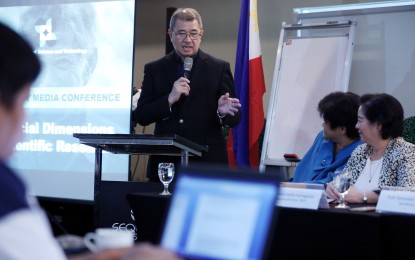
DOST Secretary Fortunato de la Peña (PNA file photo)
MANILA – The country will be able to develop vaccines once the Virology Science and Technology Institute of the Philippines (VIP) is established, Department of Science and Technology (DOST) Secretary Fortunato de la Peña said Thursday.
In a recorded meeting earlier this week, President Rodrigo Duterte urged Filipino scientists to work double-time to develop coronavirus disease 2019 (Covid-19) vaccines so the country would no longer have to rely on supplies from abroad.
"When (the country) already has the VIP, (scientists) could develop vaccines, including a Covid-19 vaccine, therapeutics and biomedical devices," de la Peña told the Philippine News Agency.
It may be recalled that he earlier said the country does not have the capability to develop a vaccine due to the lack of facility. Thus, de la Peña proposed the establishment of the VIP, which he said would be a premier research institute in virology and diseases in humans, animals, and plants.
"We need a facility that has a biosafety level 3 and 4 to develop a vaccine. At present, the country does not have such kind of facility. We also need to have an R&D (research and development) agenda and R&D funding for vaccine development," he said on Thursday.
Asked to describe these biosafety levels, UP-National Institutes of Health executive director Eva Maria de la Paz said that biosafety level 3 is appropriate for work involving microbes that can cause serious and potentially lethal disease via inhalation.
The facility that houses a biosafety level 3 laboratory must have certain features to ensure appropriate containment. "All laboratory personnel are provided medical surveillance and offered relevant immunizations to reduce the risk of accidental or unnoticed infection," de la Paz added.
Biosafety level 4, on the other hand, is the highest level of biosafety precautions. "This level is appropriate for work with agents that could easily be aerosol-transmitted within the laboratory, and cause severe to fatal disease in humans for which there are no available vaccines or treatments," de la Paz said.
Biosafety level 4 laboratories are used for diagnostic work and research on easily transmitted pathogens. These laboratories must be separated from areas with unrestricted traffic.
De la Peña, meanwhile, said the Department of Public Works and Highways is currently working on the design of the VIP. "The plan is to start the building construction next year, to finish the building by 2023," he said.
The DOST chief said they are also working with the Department of Trade and Industry's leadership, to produce Covid-19 vaccines as soon as possible.
"But this one will use the technology from abroad," he said. (PNA)
In a recorded meeting earlier this week, President Rodrigo Duterte urged Filipino scientists to work double-time to develop coronavirus disease 2019 (Covid-19) vaccines so the country would no longer have to rely on supplies from abroad.
"When (the country) already has the VIP, (scientists) could develop vaccines, including a Covid-19 vaccine, therapeutics and biomedical devices," de la Peña told the Philippine News Agency.
It may be recalled that he earlier said the country does not have the capability to develop a vaccine due to the lack of facility. Thus, de la Peña proposed the establishment of the VIP, which he said would be a premier research institute in virology and diseases in humans, animals, and plants.
"We need a facility that has a biosafety level 3 and 4 to develop a vaccine. At present, the country does not have such kind of facility. We also need to have an R&D (research and development) agenda and R&D funding for vaccine development," he said on Thursday.
Asked to describe these biosafety levels, UP-National Institutes of Health executive director Eva Maria de la Paz said that biosafety level 3 is appropriate for work involving microbes that can cause serious and potentially lethal disease via inhalation.
The facility that houses a biosafety level 3 laboratory must have certain features to ensure appropriate containment. "All laboratory personnel are provided medical surveillance and offered relevant immunizations to reduce the risk of accidental or unnoticed infection," de la Paz added.
Biosafety level 4, on the other hand, is the highest level of biosafety precautions. "This level is appropriate for work with agents that could easily be aerosol-transmitted within the laboratory, and cause severe to fatal disease in humans for which there are no available vaccines or treatments," de la Paz said.
Biosafety level 4 laboratories are used for diagnostic work and research on easily transmitted pathogens. These laboratories must be separated from areas with unrestricted traffic.
De la Peña, meanwhile, said the Department of Public Works and Highways is currently working on the design of the VIP. "The plan is to start the building construction next year, to finish the building by 2023," he said.
The DOST chief said they are also working with the Department of Trade and Industry's leadership, to produce Covid-19 vaccines as soon as possible.
"But this one will use the technology from abroad," he said. (PNA)
